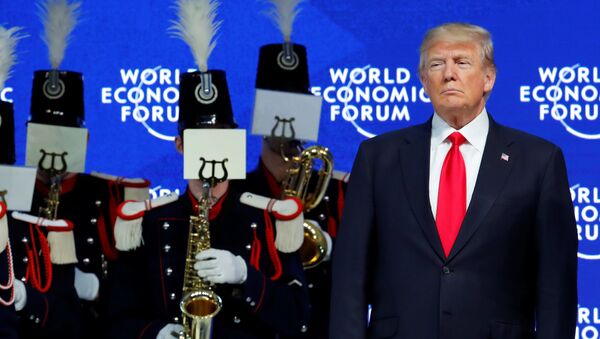Sputnik: What is your assessment of Tillerson’s words? How justified is it to call China, Russia and the EU predatory actors?
Dr. Antonio C. Hsiang: Tillerson just copied the words Donald Trump said in Davos. When giving speech to chief executives, bankers and political leaders at the World Economic Forum, Trump said that “Washington would no longer tolerate unfair trade…predatory practices were distorting markets.”
Relative vs. Absolute gains help explain the word predatory. It is Trump who is transforming US hegemon from benign to predatory. Relative gains pertain to individual winnings/gains whereas absolute gains refer to benefits being reaped by all parties involved. Realists believe in the importance of Relative Gains because they believe that having power over other countries economically lends to more security. Liberals feel that Absolute gains are important because they feel that it is important to make gains, not necessarily to make gains over other countries.
READ MORE: Donald Trump's Speech at Davos: From 'America First' to 'Fake News'
Sputnik: Why is the US making these calls now and why are they so concerned about the increasing influence of China, the EU and Russia?
Dr. Antonio C. Hsiang: Tillerson will visit Mexico, Argentina, Peru, Colombia and Jamaica. Since the NAFTA renegotiation began last August, both Canada and Mexico found US’s predatory practices will distort markets, such as Sunset Clause. Mexico and the EU have plenty of incentives to update their 17-year-old bilateral trade agreement before midyear Mexican presidential elections. After a December meeting both sides declared they were “very close” to a deal. This will change global geo-economic map.
China was now the largest trading partner with Chile, Argentina, Brazil and Peru. If Trump insists to enjoy lion’s share from all Free Trade Agreements the US already signed, more members will drift toward other FTAs which provide fairer gains. When Trump was stepping back from America’s leading role in the global trade, less relative gains will be left to the United Sates as whole.
Dr. Antonio C. Hsiang: Panama provided the most recent example of a Latin American country pivoting toward China at the expense of the United States. Just five months after China and Panama established official diplomatic relations, Panamanian President Juan Carlos Varela Rodriguez visited Beijing in November 2017. During the visit, Varela inaugurated Panama’s embassy in Beijing and consulate office in Shanghai, as well as adopting 19 agreements and a joint declaration with his Chinese counterpart. Perhaps the most important agreement is the inclusion of Panama in the Belt and Road Initiative.
Sputnik: What about the US foothold in the South America? How has their influence changed with the emergence of new actors and why is Latin America becoming more oriented towards Russia and China?
Dr. Antonio C. Hsiang: The Trump administration strongly prefers a policy of withdrawal and retrenchment rather than engagement, prompting Richard Haass, the president of the Council on Foreign Relations, to describe Trump’s foreign policy as “the Withdrawal Doctrine.” While there is a legitimate debate over whether the United States overplayed its hand after the unipolar moment following the collapse of the Soviet Union, Washington is now in danger of damaging its core interests through neglect.
READ MORE: Tillerson’s Latin America Trip an Attempt to Topple Venezuela’s Maduro – Envoy
In Davos 2018, Brazil President Temer expressed his concerns about the rising influence in South America of China, which has increased investments in his country. In fact, China offers Latin America a “strategy of mutual benefit and shared gain”. Joe Kaeser, the chief executive of Siemens, correctly pointed out “The China’s One Belt, One Road is going to be the new WTO. — like it or not.”
The views and opinions expressed by Dr. Antonio C. Hsiang are those of the speaker and do not necessarily reflect those of Sputnik.




